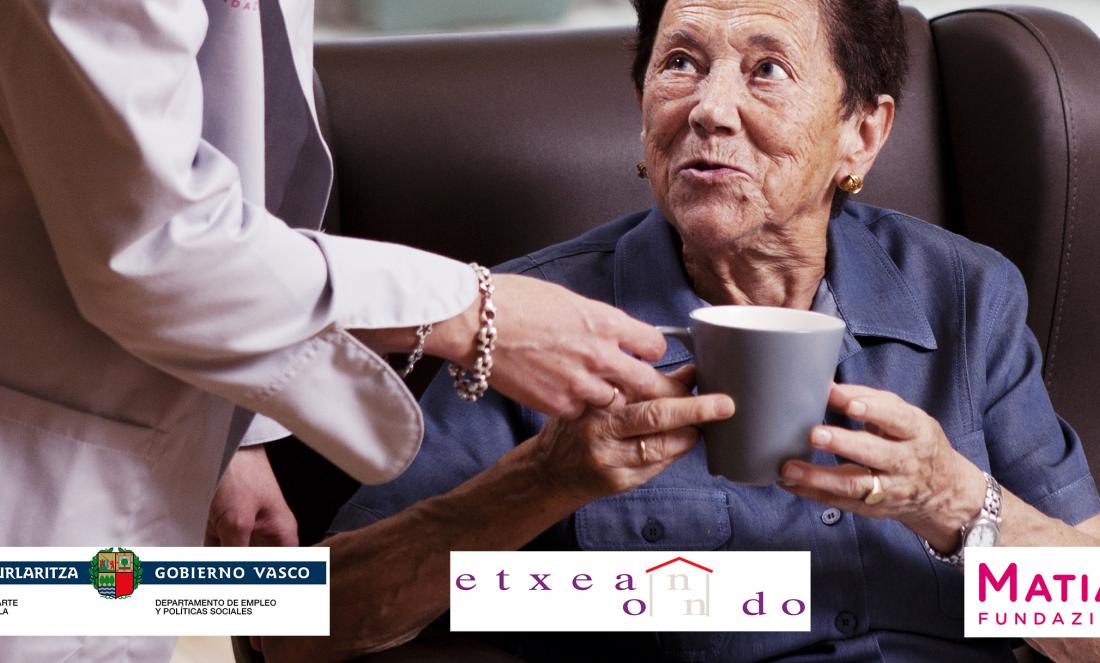
Etxean Ondo - Addresses
The Basque Institute of Statistics (Eustat) projects as a probable scenario a population by 2050 of 554,765 people who will have passed the age of 65. This population will then be 38.8% of the total population.
The Basque Country is making progress in meeting the objective of "ageing at home", which has been set by all the international bodies dealing with ageing. This slogan has also been demanded by the elderly themselves for some time now. Preference for where they would like to live if they need help and care is in their home in 95% of cases (people aged 50 and over in the Basque Country, Basa, 2010).
Thus the Home Help Service (HHS) Coverage Index has increased over the last ten years from 2.9% to 5.95% (1998-2008), day care services have tripled their CI (from 0.3% to 0.92%),
Etxean Ondo is a pilot project that aims to apply and validate the model of comprehensive, person-centred care for those who are in a situation of fragility or dependency and live in their own homes.
It revolves around a series of essential principles, including personal autonomy and continuity of care.
The model, on the other hand, fits in and is totally consistent with that described in the Basque Country Social Services Act 12/2008, as well as, in the corresponding part, with the Strategy for facing the challenge of chronicity in the Basque Country and the Framework document for the guidelines of social and health care.
In order to make progress in personalised and comprehensive care, the figure of the reference professional that the aforementioned Law 12/2008 determines to be assigned to each user or family has been considered key in the home care experiences. These professionals act in this project following the case management methodology in order to guarantee the coherence of the care itineraries and the coordination of the interventions.
Five municipalities in Gipuzkoa and Cuadrilla de Añana-Araba are participating in the project, as well as 10 town councils and one in Bizkaia. There are a total of 518 cases in the sample as a whole, with interventions in half of them.
This is a set of pilot experiences in the application of the model of comprehensive and person-centred care in which joint action is taken in various areas of intervention (services and care programmes, organisational and methodological innovations, environmental and technological actions and community work in the environment).
It should be noted, as a first evaluation of the process of articulation of the network of agents involved, assimilation and sharing of the content of the project in all its dimensions and its application, that Etxean Ondo has a positive assessment of the project itself, its objectives and the model on which it is based of comprehensive and personalised intervention. This general consideration guarantees a correct approach and design of the project
The application of the case management method by the municipal social workers (professionals of reference), who perceive this approach as a qualitative leap to which they give a high value, is particularly valued with regard to the methodology of the intervention and the coordination between sectors,
The corresponding evaluations of the experience in Gipuzkoa are currently being carried out, while in Araba and Bizkaia the project is in the middle of its intervention phase.
In the absence of definitive conclusions, the positive impact and high satisfaction that some of its programmes are having, such as the Acompaña programme, can be highlighted both in terms of respite for the family caregiver and in terms of guidance and training in the home. The group sessions organised in the municipalities have also been of great interest. Also the application of the Teleassistance service, both basic and advanced, with certain devices that respond to specific situations identified in the process.
Following this conceptualisation and the principles and criteria of the model, the project includes, in addition to the provision of personalised home care and in socio-health coordination, other personalised services and support. In some cases, its implementation has been complex for various reasons which are being analysed. It is worth mentioning the Home Proximity Services, the intervention in Accessibility in housing and surroundings, as well as the actions of dynamisation and social and citizen participation in the municipalities involved.
Seminars, workshops and other training activities have taken place throughout the process. These activities are being continued in the territories where the project is continuing throughout this year with the participation of the different agents involved and with different contents (care model, case management methodology, promoting autonomy, the everyday as well as therapeutic, social and health coordination...)
The presence at home favours a better knowledge of the different situations and circumstances and substantially improves the possibilities of information and guidance. The case management methodology influences a broader view of the intervention as well as the scope of it.
Experience shows us the need to promote social and health coordination as a decisive factor in improving care, an in-depth reflection on the current Home Help Service (HHS) and also the need to achieve sufficient transversality in all public policies to advance in the great objective of staying at home, in your usual place of life despite needing support and care. This is the way to respond to the wishes and preferences of the majority of citizens.

Add new comment